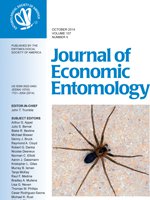The bean bug, Riptortus pedestris (F.) (Hemiptera: Alydidae) is one of the most important pests of soybean (Glycine max L. Merrill) in Korea and Japan. R. pedestris is known to appear early in spring when leguminous seeds such as soybean are not available. Because soybean has been reported to be the most important food source for R. pedestris development, in this study, we assessed the effect of this period of soybean deprivation during the nymphal stage on the development and reproduction of R. pedestris and on egg parasitism by its two egg parasitoids. More than 50% of the R. pedestris population tested survived on barley, even when they did not start feeding on soybean until the fourth instar. Nevertheless, R. pedestris nymphs deprived of soybean developed more slowly and became smaller adults than those provided with soybean. However, no difference was observed in the preovipositional period or fecundity between these groups. In addition, neither the hatch nor the egg parasitism rate by two egg parasitoids was affected by the presence or absence of soybeans in the nymphal diet. This study indicates that R. pedestris nymphs can develop successfully even when lacking this important food source in early life, and that adult reproduction is not affected by the quality of diet ingested during the nymphal period.
How to translate text using browser tools
1 October 2014
Effect of Food Deprivation Period on the Development and Reproduction of Riptortus pedestris (Hemiptera: Alydidae), and Its Egg Parasitism
Eunmok Kim,
Un Taek Lim
ACCESS THE FULL ARTICLE
It is not available for individual sale.
This article is only available to subscribers.
It is not available for individual sale.
It is not available for individual sale.

Journal of Economic Entomology
Vol. 107 • No. 5
October 2014
Vol. 107 • No. 5
October 2014
diet quality
Gryon japonicum
host exploitation
Ooencyrtus nezarae
soybean




